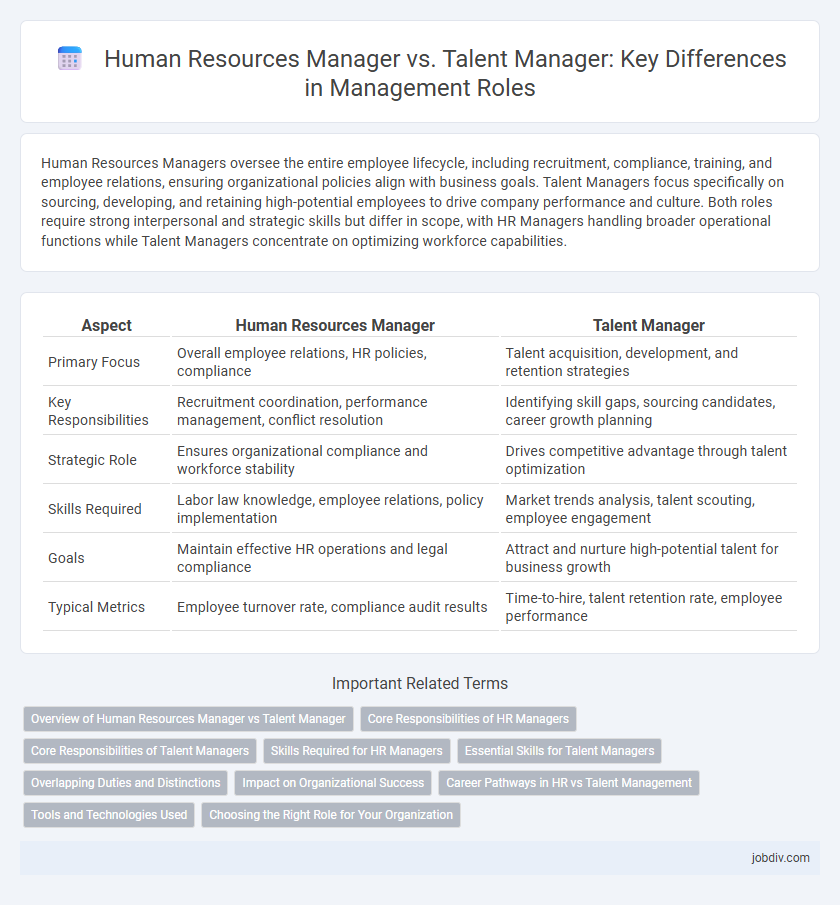Human Resources Managers oversee the entire employee lifecycle, including recruitment, compliance, training, and employee relations, ensuring organizational policies align with business goals. Talent Managers focus specifically on sourcing, developing, and retaining high-potential employees to drive company performance and culture. Both roles require strong interpersonal and strategic skills but differ in scope, with HR Managers handling broader operational functions while Talent Managers concentrate on optimizing workforce capabilities.
Table of Comparison
| Aspect | Human Resources Manager | Talent Manager |
|---|---|---|
| Primary Focus | Overall employee relations, HR policies, compliance | Talent acquisition, development, and retention strategies |
| Key Responsibilities | Recruitment coordination, performance management, conflict resolution | Identifying skill gaps, sourcing candidates, career growth planning |
| Strategic Role | Ensures organizational compliance and workforce stability | Drives competitive advantage through talent optimization |
| Skills Required | Labor law knowledge, employee relations, policy implementation | Market trends analysis, talent scouting, employee engagement |
| Goals | Maintain effective HR operations and legal compliance | Attract and nurture high-potential talent for business growth |
| Typical Metrics | Employee turnover rate, compliance audit results | Time-to-hire, talent retention rate, employee performance |
Overview of Human Resources Manager vs Talent Manager
Human Resources Managers oversee employee relations, compensation, benefits, and compliance, ensuring organizational policies align with labor laws and support workforce efficiency. Talent Managers specialize in sourcing, attracting, and retaining top talent, focusing on talent acquisition strategies, employer branding, and career development programs. Both roles collaborate to optimize workforce performance, with Human Resources Managers managing operational HR functions and Talent Managers driving strategic talent growth.
Core Responsibilities of HR Managers
Human Resources Managers oversee employee relations, compliance with labor laws, and development of company policies to ensure a productive workplace. They handle recruitment strategies, employee training programs, and performance evaluation systems to align staff capabilities with organizational goals. Emphasizing conflict resolution and benefits administration, HR Managers maintain workforce stability and support employee well-being.
Core Responsibilities of Talent Managers
Talent Managers specialize in identifying, attracting, and retaining high-potential candidates to align workforce capabilities with organizational goals. They develop strategic workforce planning, oversee talent pipelines, and implement employee development programs to enhance skills and performance. Unlike traditional Human Resources Managers, Talent Managers focus more intensively on succession planning and fostering a competitive talent advantage.
Skills Required for HR Managers
Human Resources Managers require strong skills in employee relations, conflict resolution, and organizational development to effectively manage workforce dynamics and maintain compliance with labor laws. Expertise in strategic planning, communication, and performance management is crucial for aligning human capital with business goals. Proficiency in data analysis and talent acquisition further supports informed decision-making and enhances recruitment strategies.
Essential Skills for Talent Managers
Talent Managers excel in strategic workforce planning, talent acquisition, and employee development, emphasizing skills such as performance management, leadership coaching, and data-driven decision-making. Unlike Human Resources Managers who manage broader HR functions, Talent Managers specialize in aligning individual capabilities with organizational goals, requiring advanced competencies in employer branding and succession planning. Proficiency in leveraging HR technologies and analytics platforms is crucial for Talent Managers to optimize talent pipelines and enhance employee engagement.
Overlapping Duties and Distinctions
Human Resources Managers oversee comprehensive employee lifecycle processes, including recruitment, compliance, compensation, and employee relations, ensuring organizational policies align with labor laws. Talent Managers focus more specifically on identifying, acquiring, and developing high-potential candidates to meet strategic workforce needs, emphasizing talent acquisition, retention strategies, and career development. While both roles collaborate on recruitment and employee engagement, HR Managers handle broader administrative and regulatory functions, whereas Talent Managers concentrate on strategic talent pipeline and performance optimization.
Impact on Organizational Success
Human Resources Managers optimize workforce efficiency through strategic planning, compliance management, and employee relations, directly influencing organizational productivity and legal adherence. Talent Managers specialize in attracting, developing, and retaining high-potential employees, driving innovation and competitive advantage by aligning talent strategies with business goals. Both roles synergistically impact organizational success by balancing operational stability with dynamic talent growth initiatives.
Career Pathways in HR vs Talent Management
Human Resources Managers typically follow a career pathway rooted in employee relations, compliance, and organizational development, progressing through roles like HR Generalist and HR Business Partner. Talent Managers focus on talent acquisition, development, and retention strategies, often advancing from Talent Acquisition Specialist to Talent Development Manager. Both career pathways require strong interpersonal skills, but Talent Management emphasizes strategic workforce planning and high-potential employee growth.
Tools and Technologies Used
Human Resources Managers primarily utilize comprehensive HR Information Systems (HRIS) such as SAP SuccessFactors and Workday to streamline employee management, payroll, and compliance tracking. Talent Managers often rely on specialized recruitment platforms like LinkedIn Talent Solutions and applicant tracking systems (ATS) such as Greenhouse to enhance talent acquisition and candidate relationship management. Both roles increasingly incorporate AI-driven analytics tools to optimize workforce planning and improve decision-making processes.
Choosing the Right Role for Your Organization
Human Resources Managers oversee comprehensive employee relations, compliance, and organizational policies, ensuring smooth operations and workforce stability. Talent Managers specialize in sourcing, developing, and retaining high-potential individuals critical for driving innovation and growth. Selecting the right role depends on your organization's strategic priorities--whether maintaining overall workforce management or focusing on strategic talent acquisition and development to fuel competitive advantage.
Human Resources Manager vs Talent Manager Infographic

 jobdiv.com
jobdiv.com